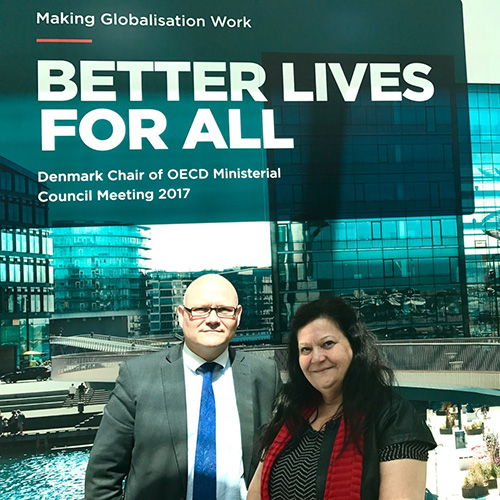Storting at OECD Forum 2017
‘Bridging Divides’ was the title of this year’s OECD Forum (in Paris, 6–7 June), which focused on discussing ways to regain trust at a time of steadily increasing scepticism about globalisation.

Bengt Morten Wenstøb and Ingebjørg Godskesen participated in this year’s OECD Forum. Photo: Storting.
What were the reasons for Brexit, for the result of the US presidential election and for the subsequent shift in US foreign policy? And why do we see multilateral cooperation and free trade among OECD countries coming under increased criticism?
Under the title ‘Bridging Divides’, this year’s OECD Forum assembled participants to discuss ways of rebuilding confidence at a time when scepticism about globalisation is on the rise. Bengt Morten Wenstøb and Ingebjørg Godskesen, members of the Storting’s Standing Committee on Labour and Social Affairs, took part in the forum.
Advantages and disadvantages of technological progress
Inclusive growth, better welfare systems and good labour policies were among the key policy approaches discussed at the forum. Emphasis was also placed on the pros and cons of technological advancement and digitisation in working life and welfare.
Among the major challenges many countries now face are jobs becoming redundant due to efficiencies and automation, and workers who lack the digital and technological skills needed to keep up with the changes taking place.
Increased digitisation and technological innovation were also key concerns of Mr Wenstøb and Ms Godskesen. Mr Wenstøb participated in a roundtable discussion conducted by Google and the McKinsey Global Institute on future jobs with digital growth and the need for new skills development. Mr Wenstøb was one of several Nordic participants invited to share the experiences of their home countries.
‘From Norway, I highlighted our experiences using digital welfare technology in the health sector, work on privacy and data security issues and the need for evidence-based policies,’ said Mr Wenstøb.
Empathy deficit?
Ms Godskesen’s activities included attending one of the forum’s Discovery Labs, which posed the question: ‘Is technology fuelling the empathy deficit?’ The experts taking part in the discussion pointed out that empathy, as measured among students in the United States, had fallen in recent decades.
‘We should pay closer attention to what happens with people, or with human interaction, when we communicate constantly through digital means,’ said Ms Godskesen.
‘What is the actual effect of today’s children not seeing the faces or hearing the reactions in the voices of those they’re communicating with on social media?’
Look to the Nordic region!
On several occasions, including the opening speech by OECD Secretary-General Angel Gurría, the Nordic model was cited as an example to be followed. The OECD also recommends, more strongly than before, policy measures that draw on a Nordic model, such as universal health and education services, inclusive growth, women’s participation in the work force and digitising welfare and public services.
Given Denmark’s chairmanship of the OECD Ministerial Council this year, it was fitting that both the OECD Forum and the annual OECD Ministerial Council Meeting had a focus on the Nordic model.
OECD Week
The OECD Forum and the Ministerial Council Meeting, which overlap by one day, together make up OECD Week, which is the OECD’s largest annual event. There were about 1,000 participants, of whom some 100 were parliamentarians.
Political representatives of the foreign affairs and finance ministries of most OECD countries were also in attendance. The discussion panels included ministers, leaders of international trade unions, scientists and representatives of business and civil society.
Last updated: 30.06.2017 15:48